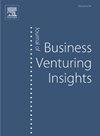Aged to perfection? Unpacking the curvilinear relationship between founder age and new venture performance
Q1 Business, Management and Accounting
引用次数: 0
Abstract
This study contributes to the growing body of research on the relationship between founders' age and new venture performance, addressing existing gaps regarding founders approaching or surpassing retirement age. By analyzing comprehensive Swedish administrative data covering all newly incorporated firms and their founders, we first document an inverse U-shaped relationship between founders' age at founding and firm survival, as well as between founders' aging and employment growth. However, our findings reveal significant disruptions in these patterns between ages 60 and 70. Specifically, the relationship between founders' age at founding and firm survival temporarily improves at the conventional retirement age of 65, transitioning into a more nuanced, bimodal M-shaped pattern. In contrast, the relationship between founders' aging and employment growth plateaus around age 65. Using abductive analysis and a regression discontinuity design, we show that the increased firm survival observed after age 65 is influenced by a different selection of entrepreneurs, as individuals with enhanced financial security from pension access, along with previous industry experience and high levels of education, are more likely to start businesses at this stage.
成熟到完美?解析创始人年龄与新企业业绩之间的曲线关系
这项研究为越来越多的关于创始人年龄与新创企业绩效之间关系的研究做出了贡献,解决了创始人接近或超过退休年龄的现有差距。通过分析涵盖所有新成立公司及其创始人的瑞典综合行政数据,我们首先记录了创始人成立时的年龄与公司生存之间以及创始人年龄与就业增长之间的反u型关系。然而,我们的研究结果显示,这些模式在60岁到70岁之间明显中断。具体来说,创始人创立时的年龄与公司生存之间的关系在65岁的传统退休年龄时暂时改善,过渡到一个更微妙的双峰m型模式。相比之下,创始人年龄增长与就业增长之间的关系在65岁左右趋于稳定。通过溯因分析和回归不连续设计,我们发现65岁以后观察到的企业存活率的增加受到不同企业家选择的影响,因为从养老金获取中获得财务安全增强的个人,以及以前的行业经验和高水平的教育,更有可能在这个阶段创业。
本文章由计算机程序翻译,如有差异,请以英文原文为准。
求助全文
约1分钟内获得全文
求助全文
来源期刊

Journal of Business Venturing Insights
Business, Management and Accounting-Business and International Management
CiteScore
11.70
自引率
0.00%
发文量
62
审稿时长
28 days
 求助内容:
求助内容: 应助结果提醒方式:
应助结果提醒方式:


